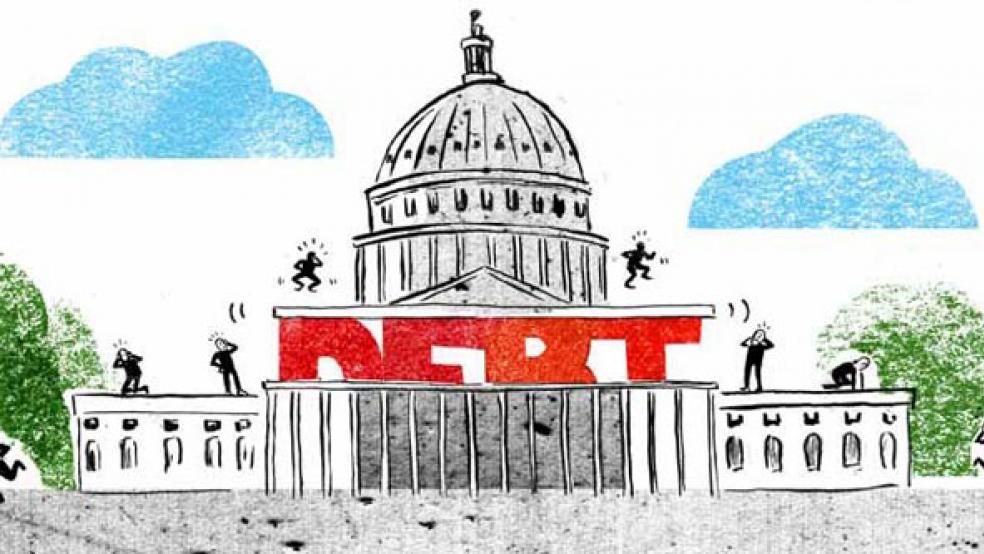Republicans, emboldened by public support for spending cuts, have taken the country to the brink of default as they fight to dial back government programs and vehemently oppose any tax increases to attack the deficit. But is the fight over the debt ceiling really an ideological battle between the two parties over the size and role of government? Or is a lot of the public support for GOP positions driven by myopia about entitlement spending and misplaced public anger?
The fact is, most people believe they pay far more to the government than they receive in return. To a surprising degree, Americans underestimate their actual consumption of government services and tax breaks. For example, 43% of people receiving unemployment insurance deny they receive government benefits, and 40% of those on Medicare answer the same way: They do not use government programs.
For the most part, people believe their taxes go to support other people. This wrongheaded perception helps explain the strong support for spending cuts. However, not just any spending cuts will do. What irate citizens object to is being forced to pay for "undeserving" recipients of government services. They’d rather see that money used to protect the Social Security, Medicare, and other benefits they paid for with their contributions but are in danger of losing, according to what they hear from politicians and the media. They are willing to get up and go to jobs they hate day after day because they have families to support, and they don't appreciate seeing their hard-earned money taken away and given to people who don't even try, people who could work if they wanted to but rely on the system instead.
I happen to think that is an erroneous view of the circumstances of the typical aid recipient. But true or not, this is the source of the opposition to many social programs.
But wasn’t it always this way? It was, to some extent, but it seems to be getting worse, and I believe the rise in inequality is a big part of the reason. As most everyone is aware at this point, inequality has been growing steadily since the 1970s. There have been substantial gains at the top of the income distribution charts, but incomes for those in the middle and bottom have been flat. As households have come under increasing stress because of their stagnant incomes, many people have started to wonder why they should share with others when nobody is sharing with them. Let those who received the gains – those at the top who don’t have to worry about making it to the next paycheck – bear the burden.
What to Do
In order to overcome the increasing resistance to social spending, we must do a better job of educating people about how their tax dollars are used and who those tax dollars actually support. But that alone won’t be enough. We must also find a way to solve the growing inequality problem, or support for important social programs will continue to fall.
When Obama was elected, I had hopes it would be the first step in turning back the rising tide of inequality. With a Democrat in power, Labor’s bargaining position would be strengthened, taxes would be more progressive as the Bush tax cuts for the wealthy were allowed to expire, there would be more attention to education problems that restrict opportunities to escape poverty, and benefits to the poor would be enhanced. In short, I expected a strong push for a wide array of progressive, equality enhancing reforms.
But except for healthcare – an important achievement I don’t want to overlook – Obama’s leadership on these issues has been mostly missing. And in some cases – e.g. allowing the extension of the Bush tax cuts for the wealthy, his seeming willingness to cut Social Security and Medicare, and his embrace of austerity – the policies the President has endorsed have taken us in the wrong direction. The rich and powerful appear to have as much sway as ever, and the policies that have been enacted under Obama reflect that.
I understand there are political realities the president must confront, and that those realities place severe constraints on what he is able to do. But the President must come to understand something that conservatives seem to comprehend almost by nature: Political change requires a long-run strategy. Even though the present political climate may not favor your point of view, you still need to fight for your side at every opportunity. And sometimes that requires sacrificing short-run political gains level for long-run objectives. It requires not giving in to the favorable politics of one-sided compromise if it undermines important principles and big-picture goals.
Republicans didn’t gain the upper hand in the debt-ceiling fight overnight, and they didn’t compromise. They kept pushing for more, and pushing and pushing until it became clear that they just might be crazy enough to take down the economy rather than give up a penny of their hard-earned tax cuts.
The Obama administration needs to realize how destructive growing inequality has become, to push relentlessly for change, and to understand the long-run nature of the battle. Political reality doesn’t stop Republicans from relentlessly fighting for what they believe in. Democrats need to do the same.
More on the debt-ceiling crisis from The Fiscal Times:
New ‘Gang of Six’ Deficit Plan Could Break the Deadlock
Debt-Ceiling Silence: What Does Wall Street Know?
Lawmakers Doubtful ‘Cut, Cap, Balance’ Will Work






